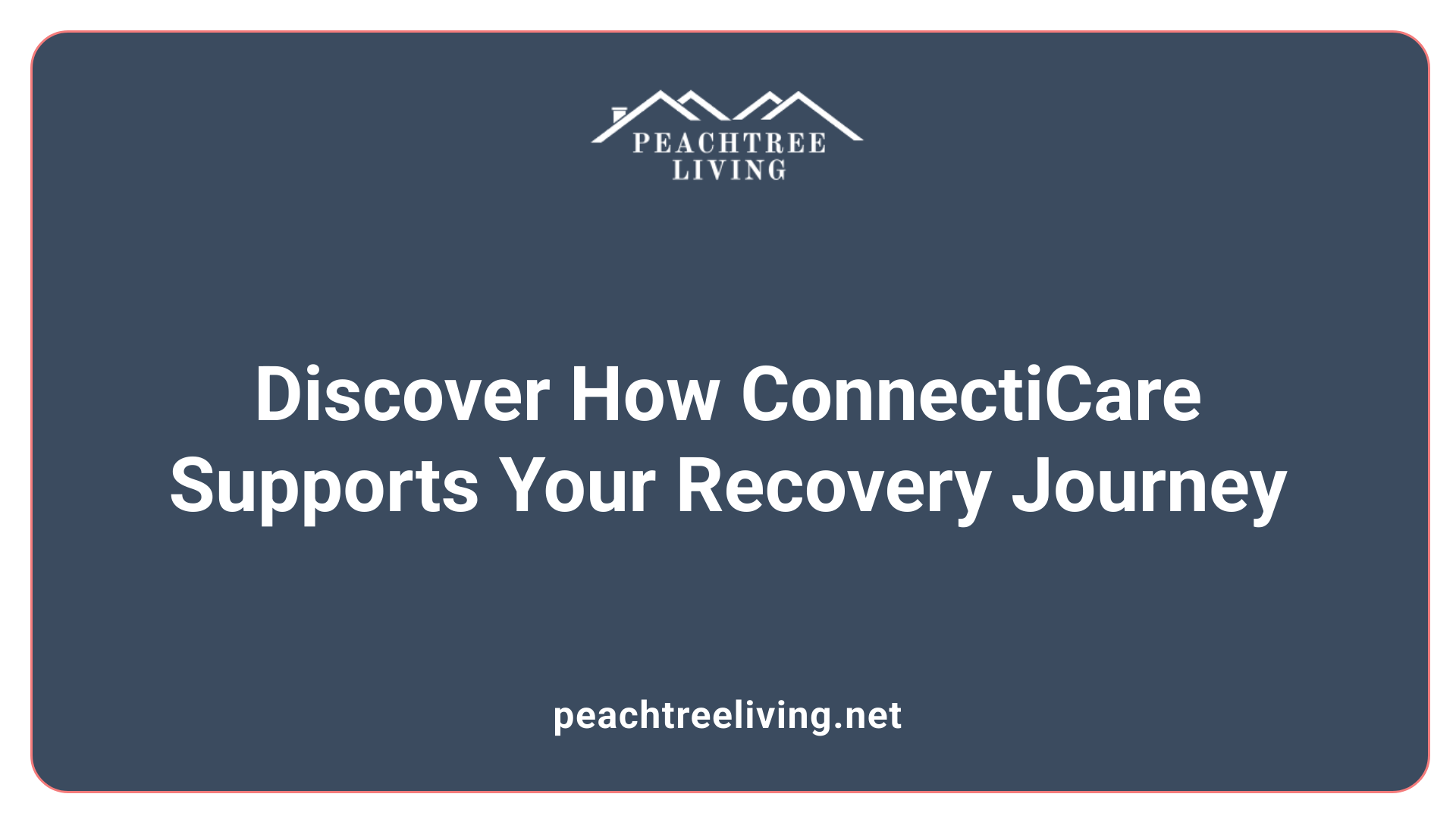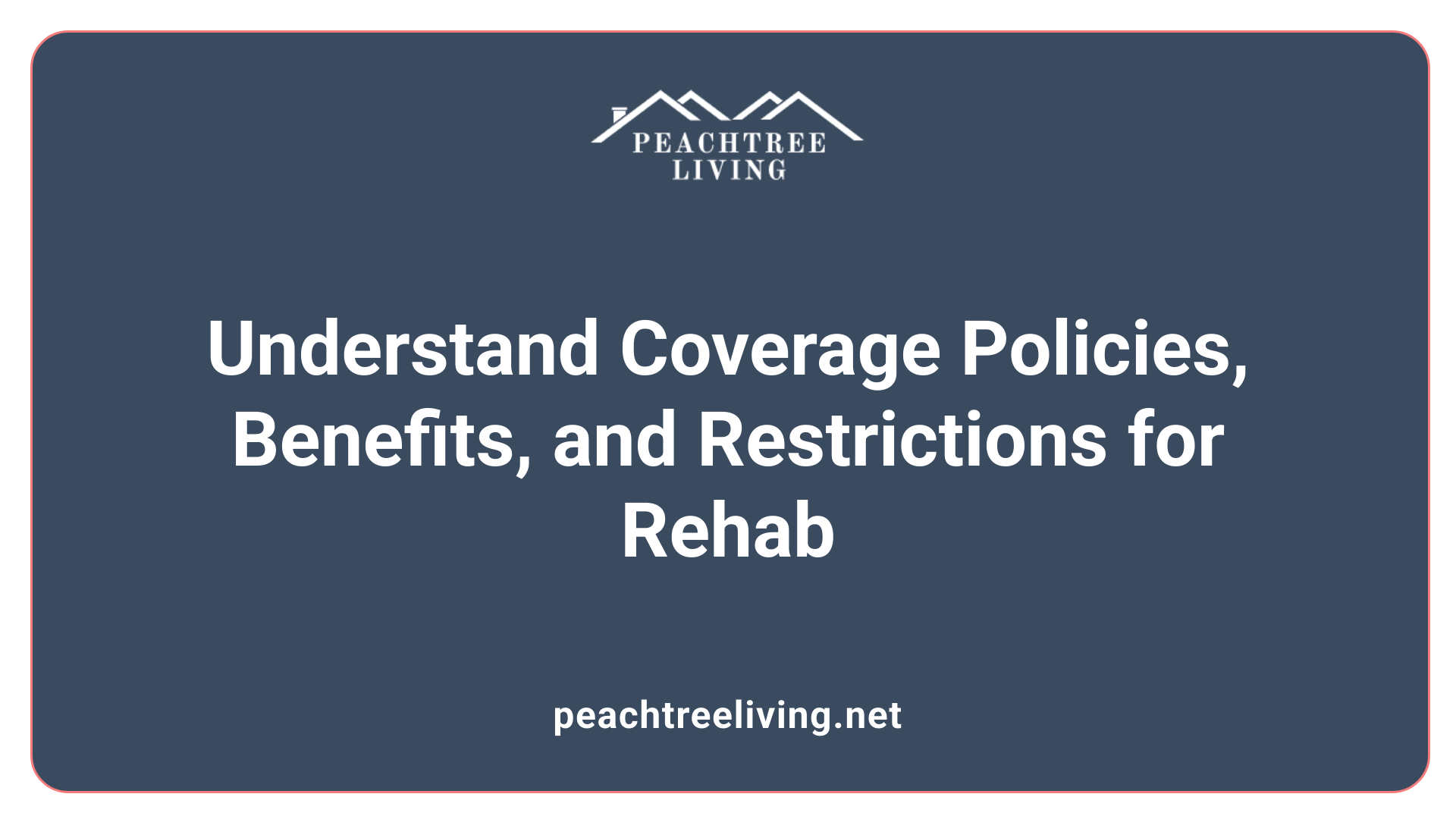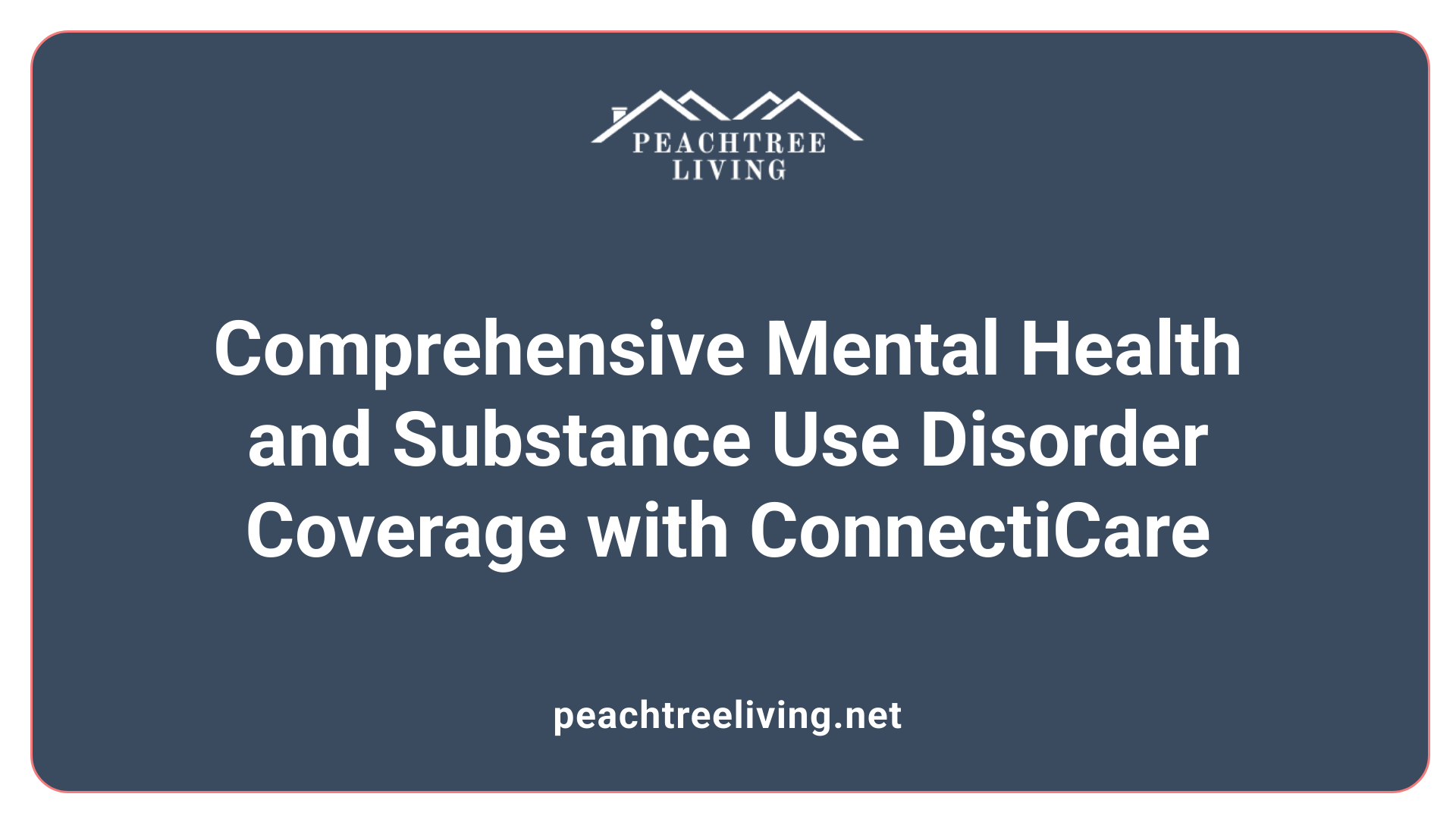Understanding Coverage for Rehab and Behavioral Health Services
Navigating insurance coverage for rehab treatment can be complex, especially with varying policies and provider networks. For individuals covered by ConnectiCare, a private insurance provider operating across several states, understanding what services are covered and how to access them is crucial for effective recovery. This guide explores whether ConnectiCare offers coverage for rehab services, covers mental health and substance use treatments, and provides insights into how to verify your benefits for inpatient, outpatient, detox, and other recovery programs.
Does ConnectiCare Cover Rehab Services?

Does ConnectiCare cover rehab services?
Yes, ConnectiCare generally covers a range of rehabilitation services for mental health and substance use disorders. These include inpatient and outpatient programs, detoxification, partial hospitalization (PHP), intensive outpatient programs (IOP), and medication-assisted treatment.
Coverage specifics can vary based on your particular plan, the state you reside in, and whether the treatment provider is in-network or out-of-network. Most plans offer benefits for medically necessary treatments, and in-network facilities usually provide lower out-of-pocket costs.
To confirm what is covered under your policy, it is advisable to verify benefits directly with ConnectiCare or the treatment facility. Many facilities, including American Addiction Centers, accept ConnectiCare and can assist with insurance verification.
Types of rehab covered by ConnectiCare
ConnectiCare’s plans include coverage for diverse treatment options:
| Treatment Type | Description | Additional Details |
|---|---|---|
| Detox services | Medically-supervised withdrawal from substances | Usually covered if deemed medically necessary; preauthorization may be required |
| Inpatient rehab | Residential stays for intensive treatment | Coverage varies; inpatient care usually requires pre-authorization |
| Outpatient rehab | Therapy sessions and medication management without staying overnight | Often more flexible and accessible, with some services requiring preauthorization |
| Partial hospitalization (PHP) | Day programs providing structured treatment | Covered as part of comprehensive outpatient options |
| Intensive outpatient (IOP) | Less intensive than inpatient, more than standard outpatient | Suitable for those needing significant support without residential stay |
| Medications | Medications such as those for opioid use disorder | Covered under medication management programs with proper approval |
Inpatient, outpatient, detox services
ConnectiCare’s benefits encompass various settings tailored to individual needs. Inpatient services include detox and residential rehab programs. Outpatient treatments incorporate therapy sessions, medication management, and dual diagnosis programs. Detoxification, often the first step, aims to safely manage withdrawal symptoms.
Coverage requirements and restrictions
Most coverage plans require prior approval or preauthorization from ConnectiCare’s Behavioral Health Program, typically managed through their partner Optum. A referral from a primary care physician may sometimes be necessary. Restrictions such as treatment duration limits and session caps might also apply.
In-network providers are recommended to make treatments more affordable, and members can access a network of qualified treatment centers across many states.
Members can find and verify appropriate services either online via the ConnectiCare website, through liveandworkwell.com, or by calling their support lines. Always confirm coverage details ahead of treatment to ensure benefits are in place and to understand any out-of-pocket costs.
Additional Resources
For further information about rehabilitation coverage, potential members and their families are encouraged to search "ConnectiCare rehab treatment coverage details" to explore detailed policies and specific plan benefits.
Scope and Types of Rehab Treatments Covered

What types of rehab treatments are covered by insurance plans like ConnectiCare?
ConnectiCare offers coverage for a variety of rehabilitation services aimed at treating mental health and substance use disorders. The range includes inpatient and residential rehabilitation, where individuals stay at a facility for intensive care and support.
Partial hospitalization programs (PHP) provide structured treatment during the day while allowing members to return home at night. These programs involve multiple therapy sessions per week, medication management, and support for co-occurring disorders.
For less intensive care, ConnectiCare covers intensive outpatient programs (IOP), which include scheduled therapy sessions, medication support, and group therapies, designed to help transition from inpatient care or serve as standalone treatment.
Outpatient treatment options, which are less restrictive and allow individuals to maintain daily life, focus on appointments for therapy, medication management, and counseling.
Detoxification services are also covered, providing medically supervised processes to safely manage withdrawal symptoms associated with substance dependence.
Overall, these treatments may include assessments, physical exams, medication-assisted therapy, counseling, and inpatient services such as room and board. Coverage specifics can depend on individual plans and may require pre-authorization based on medical necessity.
To verify the exact coverage and suitable treatment options, members are encouraged to consult their insurance plan details or contact a treatment provider directly.
In summary, ConnectiCare's insurance plans encompass a broad spectrum of rehab treatments, facilitating comprehensive care tailored to individual recovery needs. Choosing in-network providers can optimize coverage and reduce out-of-pocket costs.
For more detailed information, search for "Types of rehab covered by ConnectiCare" or contact the insurance provider directly.
Coverage Policies, Benefits, and Restrictions

How do coverage policies and restrictions affect rehab treatment under ConnectiCare?
Coverage policies for rehab under ConnectiCare generally require members to obtain pre-authorization from Optum’s Behavioral Health Program before starting treatment. This step helps verify that the treatment is medically necessary. The benefits often come with limits on how long treatment can last or how many sessions are covered, which varies depending on the specific insurance plan.
To lower out-of-pocket expenses, it’s recommended to use in-network providers. These providers have negotiated rates with ConnectiCare, making treatments more affordable. Out-of-network services may still be available but could involve higher costs for members.
Additionally, some treatments, especially specialist services, may require a referral from a primary care provider to ensure coverage is authorized and to coordinate care effectively.
In summary, coverage policies directly influence the accessibility and scope of rehab treatments, with pre-authorization, provider network status, and referral requirements being important factors.
For detailed information on specific restrictions and coverage policies, members are encouraged to search using the phrase "ConnectiCare rehab coverage restrictions and policy details" on their official site or contact their insurance support.
Mental Health and Substance Use Disorder Coverage

Does ConnectiCare cover addiction, mental health, drug, alcohol, detox, inpatient, or outpatient rehab services?
Yes, ConnectiCare provides coverage for a broad spectrum of mental health and substance use disorder treatments. This includes inpatient rehabilitation, outpatient therapy, detoxification services, medication management, and treatment for co-occurring mental health and substance use issues. The coverage is available through partnerships with organizations like Optum, ensuring members have access to comprehensive behavioral health support.
The plans cater to various levels of care, such as partial hospitalization (PHP), intensive outpatient (IOP), and outpatient treatments. Most plans cover assessments, medical exams, detox processes, medications, and inpatient stays, which include room and board costs. However, since coverage can differ based on the specific insurance plan, members should verify their benefits for exact details.
Pre-authorization from the Behavioral Health Program is typically required to confirm medical necessity before beginning treatment. This process helps to ensure that members receive appropriate care aligned with their needs.
Coverage is not limited to members residing in Connecticut; it extends to dependents under age 26 and is available for residents in different states where ConnectiCare operates.
Members are encouraged to utilize online resources or contact support services to verify if their preferred treatment centers are in-network, which can reduce out-of-pocket expenses. Participation with trusted centers like American Addiction Centers and local facilities ensures members access effective, evidence-based therapies.
In addition, ConnectiCare emphasizes confidential support, offering services like crisis helplines (e.g., 988 for mental health emergencies) and mobile apps such as Sanvello, which helps manage stress, anxiety, and depression, often at no extra cost for the first 12 months.
Services for co-occurring disorders
Recognizing the common overlap of mental health and substance use issues, ConnectiCare’s plans cover integrated treatment approaches. These include diagnostic assessments and therapies tailored to address dual diagnoses, ensuring comprehensive care for individuals with complex needs.
Online resources and crisis support
Members have various options to access behavioral health services conveniently, including scheduling virtual visits through supported platforms and accessing provider directories online. For urgent mental health crises, calling 988 connects individuals to a network of crisis centers and local Connecticut services to ensure prompt help.
To explore or verify benefits further, members can search for "ConnectiCare mental health and addiction coverage" online or contact the support helpline at 888-946-4658. This proactive approach helps individuals understand what services are covered and plan appropriate treatment pathways.
Finding Providers and Verifying Benefits
How do I find out if my insurance covers addiction, mental health, drug, alcohol, detox, inpatient, or outpatient rehab services?
To confirm whether your insurance plan includes coverage for specific rehab services, start by contacting your insurance provider directly. Most plans have detailed in-network provider directories available online, such as through resources like liveandworkwell.com. These directories list approved facilities and help you identify those in your network, which typically offer lower costs and more comprehensive coverage.
Additionally, calling the dedicated member support helpline can clarify questions about benefits, copayments, coverage limits, and whether a particular treatment program or facility is covered. Many treatment centers also offer assistance with verifying insurance benefits to streamline the process.
It’s important to verify coverage before starting treatment to ensure you have accurate information about your benefits and potential out-of-pocket expenses.
In-network provider directories
In-network directories are essential tools to find approved providers that have negotiated rates with your insurance plan. Using these directories can help you locate nearby rehab centers, mental health professionals, and outpatient facilities that accept your insurance, saving you money.
How to verify insurance benefits
You can verify your benefits online through your insurer’s website or by calling customer service. Many plans also provide mobile apps or member portals to view coverage details. When contacting the insurer, ask specifically about coverage for the type of treatment you need, including inpatient, outpatient, detox, and medication-assisted programs.
Using online tools and helplines
Online tools usually include search functions for in-network providers, benefit summary pages, and FAQs. Helpline support can guide you through the process, clarify what services are covered, and assist in pre-authorization procedures. Some centers and insurers also offer live chat options for quick assistance.
Importance of choosing in-network providers
Selecting an in-network provider usually results in lower out-of-pocket costs compared to out-of-network options. It also simplifies billing since in-network providers have direct agreements with your insurer, leading to fewer surprises or claim denials. Always verify if your preferred rehab or mental health facility is in-network before starting treatment.
| Aspect | Details | Why It Matters |
|---|---|---|
| In-network directories | Locate approved providers online | Cost-effective, streamlined billing |
| Benefit verification | Use online portals and helplines | Confirm coverage and costs |
| Provider choice | Choose in-network for lower costs | Reduce out-of-pocket expenses |
| Pre-authorization | Clarify required steps | Ensure treatment is covered |
Utilizing these resources and steps ensures you receive the appropriate care while understanding your benefits within your ConnectiCare insurance plan.
Payment Options Without Insurance
What payment options are available for rehab if you don’t have insurance?
For individuals without insurance, there are several ways to access addiction treatment services. Private pay arrangements allow patients to pay directly for their treatment out of pocket, which can be useful if insurance is not an option or if coverage is limited.
Sliding fee scales are another option, where treatment centers adjust their costs based on the patient’s income and ability to pay. Many clinics and community programs offer discounts for low-income individuals, making treatment more affordable.
Public programs such as Medicaid and Medicare often cover substance use disorder treatment. Medicaid, in particular, is a significant resource for low-income individuals and provides coverage for detox, inpatient, outpatient, and medication-assisted treatments.
State and local community programs can also be valuable, especially those funded by government grants or state health departments, offering low-cost or free services to qualifying individuals.
In addition, national helplines and support organizations can help connect people to affordable treatment options, provide guidance, and assist with program enrollment. Resources such as the Substance Abuse and Mental Health Services Administration (SAMHSA) offer confidential help and referrals.
Overall, while costs can be a barrier, many options and support programs exist to help those seeking treatment without insurance coverage.
The Role of Insurance in Covering Rehab Costs
What insurance companies are known to cover rehab costs?
Numerous health insurers such as Blue Cross Blue Shield, Aetna, Cigna, Humana, United Healthcare, and Anthem offer coverage for addiction treatment services. These companies typically include inpatient and outpatient programs, detox services, therapy, and medication-assisted treatments. In addition to private insurers, government-funded programs like Medicare, Medicaid, and TRICARE also provide support for substance use disorder treatments, ensuring broad access to care for eligible individuals.
ConnectiCare, a private insurance provider, is among those that offer such benefits tailored to individual plans. Coverage details may vary based on the specific policy, but generally, they include a range of services from detox to full inpatient care.
Coverage mandates under the Affordable Care Act (ACA)
The ACA requires insurance plans to cover medically necessary substance use disorder treatments. This legislation ensures that essential health benefits include addiction recovery services, making it less burdensome for individuals needing long-term rehab programs.
Benefits of in-network providers
Choosing in-network providers is advantageous because they offer negotiated rates with the insurer, often resulting in lower out-of-pocket costs. Many treatment centers, including American Addiction Centers, participate in insurance networks like ConnectiCare, facilitating easier access to covered services.
Coverage for substance use disorders
Coverage generally spans various substance use issues including alcohol, amphetamines, opioids, benzodiazepines, marijuana, and sedatives. Services include detox, inpatient and outpatient treatment, medication-assisted therapy, and dual diagnosis support for co-occurring mental health conditions.
| Insurance Type | Coverage Scope | Typical Services Covered | Additional Notes |
|---|---|---|---|
| Private Insurers | Varies by policy, often comprehensive | Detox, inpatient/outpatient rehab, therapy | May require preauthorization; in-network saves costs |
| Medicaid | State-dependent coverage, federally mandated | Similar to private insurance, often broader | Key for low-income individuals |
| Medicare | Requires prior approval for coverage | Detox, rehab, therapy, medication management | Available to seniors and certain disabled persons |
| ConnectiCare | Offers coverage for mental health and substance use | Detox, inpatient, outpatient, medication-assisted | Partners with Optum; preauthorization needed |
Obtaining detailed coverage information is best achieved by directly contacting the insurance provider or verifying benefits through treatment centers. This ensures that individuals can access appropriate care within their coverage plans and understand any costs involved.
ConnectiCare’s Specific Coverage for Rehab
Does ConnectiCare cover rehab services?
Yes, ConnectiCare’s plans include coverage for a range of substance abuse treatment options, such as detox, inpatient and outpatient rehab, and medication-assisted treatment. While coverage specifics can vary based on the plan type, location, and facility, many treatment centers accept ConnectiCare. It’s important for members to verify their individual benefits to understand exact coverage details.
In-network providers accepting ConnectiCare
ConnectiCare works with a broad network of providers across many states. In Connecticut, treatment centers like Bridgeport Hospital REACH Program, Recovery Services of Connecticut, Ellie Mental Health, and others accept ConnectiCare. Choosing in-network providers generally offers lower out-of-pocket costs, so members are encouraged to verify whether their preferred facility is in-network.
Coverage for detox, inpatient, outpatient, medication-assisted treatment
ConnectiCare provides coverage for various treatment levels. Detox programs, inpatient rehab, partial hospitalization (PHP), intensive outpatient (IOP), and outpatient therapies are all included under many plans. Coverage includes assessment, therapy, medications, and inpatient services such as room and board.
Partnerships with treatment centers
ConnectiCare has partnerships with nationwide addiction and treatment centers, such as American Addiction Centers, which accept the insurance and offer in-network services in multiple states. This network helps facilitate access to certified care providers and ensures that treatments are covered as medically necessary.
Coverage limits and benefits for different plans
Coverage varies based on plan categories—Gold, Silver, and Bronze—with differing levels of benefits. Plans generally cover at least some part of the treatment costs, emphasizing that therapy, detox, and inpatient services are included, often subject to preauthorization and copayments. The duration and extent of coverage depend on individual needs and plan specifics, typically with minimum coverage periods around three months.
Additional Considerations
Members can verify their coverage and find appropriate providers by contacting ConnectiCare directly via their online platform or helpline. Preauthorization from Optum’s Behavioral Health Program is usually required for intensive services, ensuring treatments are deemed medically necessary. The insurance also includes confidentiality and support resources, making it easier for members to access needed care.
Table 1: Summary of Covered Treatment Types
| Treatment Type | Description | Typical Coverage Details |
|---|---|---|
| Detox | Medical detoxification for substance withdrawal | Covered with referral, preauthorization often required |
| Inpatient Rehab | Residential programs for intensive treatment | Partial or full coverage, based on plan specifics |
| Partial Hospitalization (PHP) | Day programs offering comprehensive care | Usually covered, preauth needed |
| Intensive Outpatient (IOP) | Less intensive outpatient programs | Generally covered with clear guidelines |
| Outpatient Therapy | Counseling and therapy sessions at clinics | Usually copayment-based, preauthorization recommended |
Table 2: Types of Substance Use Disorders Covered
| Substance Type | Coverage Includes | Additional Notes |
|---|---|---|
| Alcohol | Rehab, detox, outpatient, inpatient | Includes therapy, medication management |
| Opioids | Detox, inpatient, outpatient, medication-assisted | Support for opioid use disorder, including methadone, buprenorphine |
| Benzodiazepines | Detox, outpatient, inpatient | Covered as part of mental health/substance use treatment |
| Stimulants | Assessment, outpatient, inpatient | Coverage depends on treatment plan |
Members are encouraged to clarify their benefits and coverage limits by consulting directly with their provider or contacting ConnectiCare. Overall, the insurance facilitates access to essential treatment options for mental health and substance use disorders.
Assessing Your Benefits and Next Steps
How do I find out if my insurance covers addiction, mental health, drug, alcohol, detox, inpatient, or outpatient rehab services?
Start by reviewing your insurance policy or contacting Customer Service. Many providers also have online portals to verify benefits and in-network providers. Treatment centers can often assist by verifying insurance coverage prior to admission.
How to confirm your coverage
To confirm your benefits, visit the insurance company's website or call their customer service line. ConnectiCare offers multiple ways to check your benefits, including an online registration portal and direct support services. It’s important to clarify which services are covered under your specific plan, including detox, inpatient, outpatient, and medication-assisted treatments.
Working with treatment providers to verify insurance
Many treatment centers, including American Addiction Centers, accept ConnectiCare and can verify your insurance benefits for you. When selecting a rehab facility, confirm whether it is in-network to reduce out-of-pocket costs. Providers typically require pre-authorization for certain services, which your treatment center can assist with by submitting necessary documentation.
Understanding co-pays and deductibles
Coverage will vary based on your plan, with different levels of copayments and deductibles. In-network providers usually offer lower costs. Know your plan’s specifics on out-of-pocket maximums, co-insurance rates, and whether certain treatments require upfront payment. Checking these details in your policy or via your insurer's portal helps prevent surprises.
Planning your treatment with insurance support
Once your benefits are verified, work with your healthcare provider and insurer to develop a suitable treatment plan. Ensure that your chosen rehab center and therapies are covered under your plan, and understand the process for getting treatments approved. Many plans require preauthorization for inpatient or intensive outpatient programs.
Additional resources
You can visit the website or call the helpline at 888-946-4658 for assistance in identifying in-network providers and verifying your benefits. Additionally, using the search query "How to verify insurance coverage for rehab" can provide helpful guidance and tools to manage your coverage and treatment planning.
Advocacy and Support Resources
In a mental health crisis, how can I get support, and what services are available?
If you or someone you know is experiencing a mental health crisis, immediate support is crucial. You can dial 988 to reach a confidential national helpline that connects callers to local crisis centers across the country, including Connecticut. These centers offer immediate assistance, stabilize the situation, and can coordinate additional care or emergency services if necessary.
Beyond emergency calls, many organizations provide online resources, support groups, and educational information for individuals and families. Such resources aim to offer ongoing help for managing mental health conditions or substance use challenges.
National helplines
- 988 Suicide & Crisis lifeline: Provides 24/7 support for people in crisis.
- SAMHSA’s National Helpline: Offers free, confidential information for individuals facing mental health and substance use disorders.
Crisis support services
Crisis support includes medical detox, emergency psychiatric intervention, and short-term stabilization facilities. Hospital emergency departments often coordinate with community crisis teams to provide immediate care.
Support for families and loved ones
Families and loved ones play a pivotal role in recovery. Support groups and educational programs designed for families can help them understand mental health conditions, learn how to provide effective support, and navigate treatment options.
Many resources are accessible online via websites such as liveandworkwell.com, where families can find directories of in-network providers and support programs. Additionally, support services may involve therapy, counseling, or community-based programs tailored to family needs.
Exploring further assistance
To find more comprehensive mental health crisis support services and community programs, searching with terms like "Mental health crisis support services" can help locate local and national resources tailored to specific needs.
| Resource Type | Contact/Website | Purpose |
|---|---|---|
| National Helpline | 988, or visit nationalhelpline.org | Immediate crisis intervention |
| SAMHSA’s National Helpline | 1-800-662-HELP (4357) | Treatment and support referrals |
| Treatment Centers & Providers | liveandworkwell.com, 888-946-4658 | Finding local, in-network treatment facilities |
Understanding how to access these services can greatly ease the pathway to support, treatment, and recovery for individuals and their families.
Ensuring Access to Necessary Rehab Services
Connecting with the right programs and verifying your insurance benefits can significantly streamline the recovery process. For ConnectiCare members, understanding coverage options for rehabilitation—whether inpatient, outpatient, detox, or medication-assisted treatment—is essential in planning effective recovery strategies. Always consult your policy documents and speak with representatives or your treatment provider to confirm coverage details and explore financial options. With informed planning and professional support, recovery is within reach.
References
- Does ConnectiCare Insurance Cover Drug & Alcohol Rehab?
- ConnectiCare Insurance Coverage for Rehab and Detox
- Mental Health | ConnectiCare
- ConnectiCare Insurance Coverage for Drug & Alcohol Rehab
- ConnectiCare Treatment Centers and Rehab Connecticut
- ConnectiCare Insurance Coverage for Drug & Alcohol Rehab
- Connecticare Insurance Coverage for Rehab in San Antonio | New ...
- Does ConnectiCare Cover Substance Abuse Rehab?

